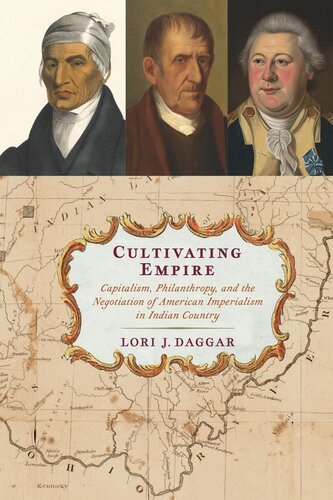

Most ebook files are in PDF format, so you can easily read them using various software such as Foxit Reader or directly on the Google Chrome browser.
Some ebook files are released by publishers in other formats such as .awz, .mobi, .epub, .fb2, etc. You may need to install specific software to read these formats on mobile/PC, such as Calibre.
Please read the tutorial at this link: https://ebookbell.com/faq
We offer FREE conversion to the popular formats you request; however, this may take some time. Therefore, right after payment, please email us, and we will try to provide the service as quickly as possible.
For some exceptional file formats or broken links (if any), please refrain from opening any disputes. Instead, email us first, and we will try to assist within a maximum of 6 hours.
EbookBell Team

4.8
54 reviewsEmploying the terminology of speculative philanthropy to underscore the ways in which a desire to do good often coexisted with a desire to make profit, Cultivating Empire links eighteenth- and early-nineteenth-century U.S. Indian policy—often framed as benevolent by its crafters—with the emergence of racial capitalism in the United States.
Cultivating Empire charts the connections between missionary work, capitalism, and Native politics to understand the making of the American empire in the late-eighteenth and early-nineteenth centuries. It presents American empire-building as a negotiated phenomenon that was built upon the foundations of earlier Atlantic empires, and it shows how U.S. territorial and economic development went hand-in-hand. Lori. J. Daggar explores how Native authority and diplomatic protocols encouraged the fledgling U.S. federal government to partner with missionaries in the realm of Indian affairs, and she charts how that partnership borrowed and deviated from earlier imperial-missionary partnerships.
Employing the terminology of speculative philanthropy to underscore the ways in which a desire to do good often coexisted with a desire to make profit, Cultivating Empire links eighteenth- and early-nineteenth-century U.S. Indian policy—often framed as benevolent by its crafters—with the emergence of racial capitalism in the United States. In the process, Daggar argues that Native peoples wielded ideas of philanthropy and civilization for their own purposes and that Indian Country played a critical role in the construction of the U.S. imperial state and its economy. Rather than understand civilizing missions simply as tools for assimilation, then, Cultivating Empire reveals that missions were hinges for U.S. economic and political development that could both devastate Indigenous communities and offer Native peoples additional means to negotiate for power and endure.